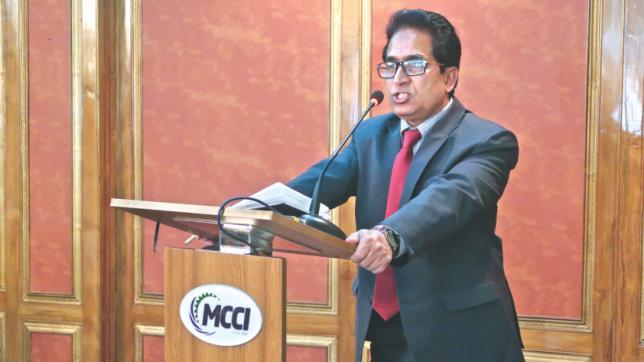Just come to me

National Board of Revenue Chairman Md Mosharraf Hossain Bhuiyan yesterday called upon businesses to approach him for revenue-related issues before going to the ministers and the Prime Minister's Office to resolve their problems.
“Currently, I am the senior most in the current government but anyone can approach me. So, before going to some other places, like the ministers' office and the PMO, just come to me and see whether your problems are solved or not.”
Bhuiyan's comments came at the quarterly luncheon meeting of the Metropolitan Chamber of Commerce and Industry (MCCI), Dhaka in response to allegations from BSRM Chairman Alihussain Akberali of harassment by taxmen since September last year.
At the meeting, Akberali said taxmen were claiming undue tax from his company. The steel giant is facing troubles in getting tax refunds, too.
He said he was going to meet with Salman F Rahman, the prime minister's adviser on private industry and investment, and the commerce minister, and was also trying to get an appointment with the finance minister to get solutions for his company's revenue-related problems.
In response, the NBR chairman said he spends a good amount of time to hear out people's problems and resolve them. “I try to convince my officers that you should serve, not rule. I think increased tax collection is possible through building good relationships,” Bhuiyan said at the meeting, which was attended by the business community and top executives of several local and multinational companies.
He, however, said multinationals and some local firms operate in Bangladesh transparently by keeping one book of accounts. Yet, there are some big local institutions that taxmen have to spend a considerable time to collect tax.
Bhuiyan mentioned of leakages of garment accessories, chemicals and papers imported duty-free by firms to make finished products for export into the domestic market.
His office has taken a zero tolerance approach to curbing the leakages of zero-duty goods from bonded warehouses. The VAT law 2012 would be implemented by July after bringing in some amendments, particularly in rates, he said.
The NBR has sought opinions from the business community at the earliest.
“If none gives opinion, we will go our own way and all will have to abide by. I assure that there will be nothing in the law for you to be panicked,” he added.
At the meeting, the MCCI requested the NBR to make the proposed law and its related rules available to the business community as soon as they are finalised.
“We should be given sufficient time to comment on it,” said MCCI President Nihad Kabir.
Such a major law will significantly affect a large proportion of businesses, so they should be given adequate time to prepare for the changes that it will entail, she said.
“We do not foresee being able to comply fully with the law from the first of July. A six-month to one-year lead time will allow us to be compliant.”
The MCCI also demanded rationalisation of the corporate tax rate, which it deems to be too high, to encourage transparent and accountable entrepreneurship.
Nihad Kabir, citing a report in the media regarding NBR's plan to knock on people's doors to bring in new taxpayers, said: “I think this idea of visiting houses could lead to harassment and intimidation.”
It is also a severe threat to privacy as it may lead to unscrupulous individuals gaining entry into people's homes.
“It may have a severe negative impact,” she said.
She also urged the NBR to ensure transparency and accountability of the tax administration, official disclosure on various procedures such as duty draw-back, and impact assessment of fiscal measures taken time to time.
Shehzad Munim, president of the Foreign Investors' Chamber of Commerce & Industry, demanded predictable tax measures so that they can draw plans for their businesses accordingly.
At the meeting, businesses also urged the NBR for refunds against all the advance income tax that they pay.
Syed Manzur Elahi, chairman of Apex Group, suggested the NBR for framing tax measures that encourage investment needed to create jobs instead of focusing only on revenue collection.
